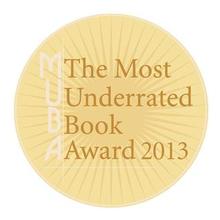The Most Underrated Book Award 2013, which I helped judge, was announced on Friday at the close of the SPN Independent Publishing Conference. The winner was the wonderful Fish-Hair Woman by Merlinda Bobis (Spinifex Press).
In case it’s of interest, here’s a transcript of the speech I gave on the night.
The day after I was asked to help judge the Most Underrated Book Award, an enormous box of books was delivered to my office.
This experience was surprising for two reasons. First, my dealings with Australia Post haven’t usually involved timely delivery. Second, the box was filled to the brim with erotic romance.
Had I misunderstood the brief entirely?
Was this “underrated books” business something to do with the Ratings Classification Board? Had Tony Abbott, always industrious about such things, enacted some sort of public decency act?
I was quite relieved when a second box, its contents entirely safe for work, arrived a few days later.
But again, as I sifted through my box of award candidates, I was struck with uncertainty.
Thanks to my unwitting exposure to such classy titles as Wallbanger, I now had a fairly good idea of what made a book X-rated, but what about underrated?
Could such a thing be judged? Had the Small Press Network overrated my skills at rating the underrated? And, what’s more, wasn’t the very title of the award a paradox?
My fellow judges had similar questions, and we spent some time trying to come up with a workable definition.
What was meant by underrated in the literary world?
Did underrated mean a book that had been well reviewed but that hadn’t sold as well as intended?
Was it one that had sold well but that hadn’t received the hoped-for media coverage or critical acclaim?
In my experience, books hold the answers to most problems, so I set aside these concerns for a while and started to read.
And as I worked my way through the nominees—some of them strange and lovely, others bold and raw, others a bizarre but striking explosion of narrative verve—I realised that I’d been thinking about the word “underrated” entirely incorrectly.
Somehow in my head, perhaps from watching all those episodes of Daria as a pre-teen, “underrated” had become synonymous with “underachieving”.
And that wasn’t at all the case. Underachieving implies deficiency.
Underrated, on the other hand, implies that something special has gone somewhat unrecognised for whatever reason.
And as I read for this award, marvelling at the sheer gutsiness of some of these authors and the publishers who had backed them, I realised just how true that was.
An underrated book has all of the hallmarks of a good quality, successful, enduring title.
It simply moves on a different trajectory. Its journey is different from other books.
An underrated book is a quiet achiever. One that trickles its way into the collective consciousness.
One that affects you in such a way that you only want to recommend it to those you trust enough to properly appreciate it. It’s the one you’ve probably passed along to a friend with a disclaimer about the ugly cover or the tiny print or the fact that half of the pages are falling out.
It’s the kind of book that ends up full of marginalia and covered in coffee-stains because it’s always within reach for anyone desperate for a makeshift coaster. You’ve probably invested in two copies for this reason.
It’s the kind of book that can never be overrated, because it’s hand-sold only by people who are truly touched by it, rather than indifferently passed along because you want to free up some space on your shelves.
An underrated book never explodes upon the market so quickly that it gets picked up by an audience that is wrong for it, or by critics grudgingly assigned to the key titles of the season. It’s never pitched as Bestselling Movie X meets Bestselling Movie Y…with zombies.
An underrated book is one that requires a little bit more patience than today’s fickle, fleeting marketplace allows, which is why we’re lucky to have this award.
I’ve heard the award—on that highly regarded peer-reviewed medium that is Twitter—described as a backhanded compliment. But I promise you that “most underrated” and “least overrated” aren’t synonymous, just as “underrated” and “underachieving” aren’t.
Nor is the MUBA some sort of parochial bookish movement to celebrate the literary underdog or the battler.
The books on the shortlist are books that I—and the other judges—honestly feel are going to resonate.
But resonance by definition is something that isn’t instantaneous or short-lived.
It lingers. It affects you. And maybe it changes you just a little bit.
The MUBA is designed to help these books sustain that note.
An underrated book is an underground book.
It’s also a lucky book.
Because today’s underground book is tomorrow’s cult classic.
And being dubbed a cult classic is not only tremendously cool, but it also means that your book will neatly sidestep the indignity of being involved in a zombie mash-up.
You can find more about the shortlisted titles on the SPN website, and purchase them from Readings or other local booksellers.
The post Why today’s underrated books are tomorrow’s cult classics appeared first on Read in a Single Sitting - short books, page-turners, and books you can't put down.



